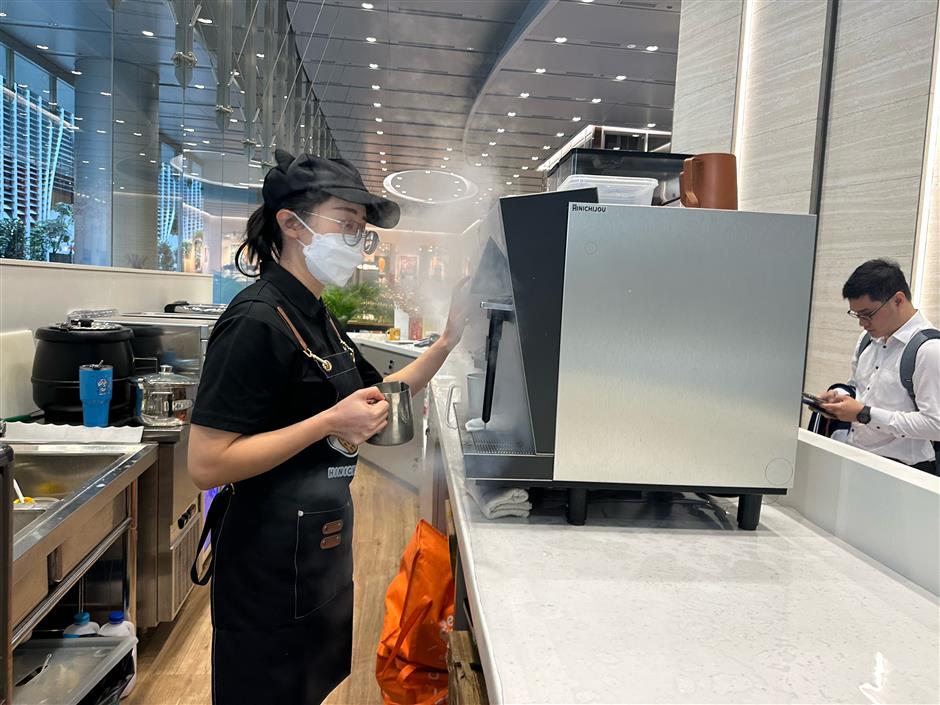Shanghai's success in employing the disabled extends 'paw' overseas

Hinichijou's first outlet in Shanghai opened in 2020 on Yongkang Road.
The popularly known "Bear Paw Café" was a hit when it opened in Shanghai in 2020, with coffee served by a fur-covered arm reaching out from a hole in the wall. Its wacky service model was created to accommodate disabled staff too timid to face customers.
What became the Hinichijou coffee chain has now opened its first overseas outlet in Singapore, two days after World Autism Awareness Day. The café, located in the Bank of Singapore Center, is staffed by people suffering from intellectual disabilities.
"We hope it will become an Instagrammable location here in Singapore to spread the concept of doing good," café manager Lee Swee Keng told Shanghai Daily.
Indeed, Shanghai cafés were pioneers in promoting the concept that people with disabilities not only want to work but can work.
In 2018, A-Coffee became an overnight sensation with teenage baristas and waiters, all with autism.
Founded by charity advocate Cao Xiaoxia, A-Coffee was more a training ground than an actual coffee shop; volunteers played the roles of customers for autistic teenagers.
It led, however to other cafes with disabled workers opening in Shanghai and operating as real businesses. Hinichijou stands out because of its eye-catching presentations.

The new Hinichijoy café in the Bank of Singapore Center attracts nearby office workers.
In nearly two-and-half years, it has grown from a single "bear hole" to a nationwide chain with dozens of outlets. Walls that used to shield staff have been removed. Disabled staff are no longer shy about facing customers anymore.
In China, Hinichijou currently hires people with hearing or visual impairments. But in Singapore, the new café employs two baristas with autism.
"They work really hard," Lee said. "They are proud of their work and they are willing to improve themselves. Sometimes they do meet customers they find difficult to cope with, but they always bring passion and enthusiasm to the job."
One of the baristas is Michael Ang, 29, who has mild autism.
"I used to be a waiter," he said. "Quite by accident, I saw a barista making coffee, and I was intrigued. Then, the idea came to me. I wanted to become a barista."

No barriers at the counter: disabled baristas no longer feel timid around customers.
The Singapore store was opened in cooperation with the Social Kitchen, which seeks to become the largest employer of disadvantaged individuals in Singapore.
Senior baristas from Shanghai went to the island nation earlier this year to provide training. The coffee beans used in the shop are grown by disabled farmers in China's Yunnan Province, Hinichijou co-founder Wang Tian told Shanghai Daily.
"We actually hadn't planned to expand to Singapore, but when we were invited to open a shop there, we jumped at the chance," he said.
Wang said customers there especially like specialty coffee drinks.
"Shanghai's coffee market is quite a rat race, with coffee shops working at a frenzied pace to make specialized coffee to survive," he said. "So, it's not a far jump to expand to satisfy Singapore's tastes."
Shanghai has more than 7,000 coffee shops, or an average of just over three for every 10,000 people. That ranked it No. 1 among world cities as of the end of June 2022.
At the 7th annual Lujiazui Coffee Festival earlier this month, 70 seasonal specialty coffee drinks vied for honors. They included coffee blended with Beijing douzhi, a fermented bean drink, and Suzhou biluochun, a top Chinese green tea.
With the success of its first overseas venture, Hinichijou is planning further offshore expansion.
"This year, we want to open 10 cafés in Singapore," Wang said. "The second one will be in tandem with a local school for the blind. Then, we hope to expand to the Philippines, Malaysia, Indonesia and beyond."

Yin Tianbao serves coffee at a Pudong café where he is manager and minority shareholder.
Shanghai's "special" coffee shops
1) Seed of Inspiration by Hinichijou
Address: Times Square, 500 Zhangyang Rd, Pudong
It is operated by visually impaired twin brothers Yin Tianbao and Yin Tianyou. Tianbao is also the manager and 10-percent shareholder.
The interior has been specially designed to accommodate their disability. The control panel of the automated coffee machine has different shapes of buttons to distinguish the various brews.
The shop welcomes customers with disabilities with free cups of coffee every day.
2) Menggongfang
Address: 508 Qihe Rd, Pudong
Menggongfang, which translates as "dream workshop," employs people with mental disabilities, such as autism and Down's syndrome. It operates in cooperation with the Pudong Special School for young people with intellectual disabilities.
It's not a charity, but rather an authentic business. All staff sign work contracts. In addition to wages, they receive basic social insurance.
3) Lili Time
Address: 63 Mengzi Road E., Huangpu District
This coffee shop hires people with hearing loss. The name is an abbreviation for the slogan "love is life illuminated."
Beyond coffee, the shop also sells works by disabled artists and hosts charity events such as music performance by autistic children.

Staff with intellectual disabilities serve coffee to a customer at Menggongfang.

An employer with hearing impairment uses sign language to communicate with a customer at LiLi Time café.















